EHRs, the digital guardians of patient information, were already making strides in modernizing healthcare. But the introduction of AI is like a bolt of lightning, igniting a storm of innovation, efficiency, and hope. The journey to harness the power of AI in EHR systems was underway to revolutionize healthcare delivery. And now, it’s happening!
Large healthcare giants with revenues exceeding $10 billion are boldly committing over $50 million to AI projects. Meanwhile, mid-sized organizations, with revenues ranging from $5 billion to $10 billion, are stepping into the AI arena with investments under $50 million.
– As per Deloitte
This unprecedented wave of investment was driven by a clear vision—transforming healthcare processes, enhancing existing services, and, most importantly, lowering costs for both providers and patients.
But how does Artificial Intelligence for EHR work, and how to go about the EHR software development process?
In this exciting exploration of AI-powered EHR software development, we aim to illuminate the path forward. Whether you are seeking to embrace the urgency and value of AI technology or just looking for an innovative solution for your business, this guide will be an enlightening read on uncovering the potential and possibilities of AI in healthcare.
Before we dive into the mechanisms of developing AI-powered EHR system, let us look at what AI’s role in EHR is.
What is an EHR system?
Electronic Health Records (EHR) is a digital data powerhouse for healthcare professionals, containing crucial patient data like medical history, vital signs, and more, which is readily accessible and helps streamline daily workflow.
EHRs significantly benefit healthcare providers by reducing errors, ensuring timely access to critical clinical information, enhancing efficiency, and supporting clinical research and population health management efforts.
Unlike Electronic Medical Records (EMRs), EHRs are designed for seamless sharing across multiple healthcare providers, offering a comprehensive and collaborative view of your patient’s health and empowering you to deliver top-notch care.
When it comes to digital healthcare, the Netherlands is a leading country being identified as one of the top driving forces in Europe. Dutch players in e-health like ChipSoft demonstrate digital healthcare transformation should align with an organization’s strategic goals, as technology is essential for providing efficient and sustainable healthcare solutions.
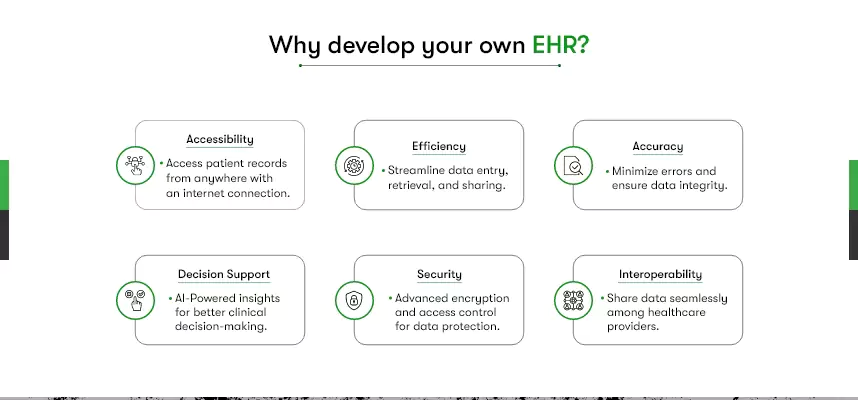
Before we dive into the mechanisms of developing AI-powered EHR system, let us look at what AI’s role in EHR is.
AI’s Role in Modern EHR Systems
Artificial Intelligence (AI) is transforming various industries, and healthcare is no exception. One of its most significant impacts is on Electronic Health Records (EHR) systems, which play a critical role in improving patient care and operational efficiency.
AI-powered EHR systems enhance accessibility, accuracy, and interoperability, ensuring that healthcare providers can deliver better patient outcomes. By analyzing vast amounts of medical data in real time, AI enables smarter, faster, and more personalized healthcare solutions.
For instance, AI-driven EHR platforms can assist doctors in making data-backed decisions, reducing errors, and improving treatment plans based on a patient’s comprehensive medical history.
Key Applications of AI in EHR Systems:
Seamless Data Integration: AI facilitates the secure exchange and consolidation of EHR data across different healthcare providers, ensuring continuity of care.
- Real-Time Alerts: AI can instantly notify healthcare professionals about potential drug interactions, abnormal test results, or urgent medical conditions, enabling quicker interventions.
- Personalized Patient Care: AI-driven analytics provide tailored health recommendations, medication management, and lifestyle advice based on an individual’s medical history, improving overall treatment effectiveness.
By integrating AI into EHR systems, healthcare providers can enhance efficiency, reduce administrative burdens, and offer more accurate, patient-centered care.
What are the Benefits of AI-Driven EHR Development?
Electronic Health Records (EHR) systems have long been criticized for their complexity and inefficiencies, but AI is transforming how they function. AI-driven EHR development makes healthcare systems more intuitive, accurate, and adaptive, ultimately improving patient care and administrative efficiency.
1. Enhanced Data Accuracy
AI reduces manual errors by automating data entry and validation. It ensures that medical records are consistently accurate, minimizing discrepancies in patient information and improving clinical decision-making.
2. Seamless Integration
AI-powered EHR systems can integrate with various healthcare services, including telemedicine platforms, diagnostic tools, and insurance systems, creating a more connected and efficient healthcare ecosystem.
3. Predictive Analysis
AI-driven EHR platforms provide predictive insights that help healthcare providers anticipate patient needs. For example, AI can analyze a patient’s medical history to identify early signs of chronic diseases or suggest preventive measures based on risk factors.
By leveraging AI-driven EHR development, healthcare institutions can enhance service quality, streamline operations, and improve patient outcomes with data-driven, intelligent healthcare solutions.
How is AI used in EHR?
Artificial Intelligence is integrated within Electronic Health Records (EHR) systems to streamline processes, improve patient care, and reduce costs. Because Artificial Intelligence (AI) is like a superpower for computers, it enables them to think and make decisions, just like humans but much faster and with lots of data.
AI learns from information; the more it has, the better it gets at tasks like recognizing patterns, predicting outcomes, and solving problems. Now, let’s explore how AI is put to work within EHR systems to revolutionize healthcare.
Clinical Decision Support:
AI-powered EHR systems help doctors make better decisions by analyzing patient data and providing insights. For example, they can suggest the most suitable treatment options or predict patient outcomes based on historical data.
Medical Image Analysis:
AI algorithms can analyze medical images like X-rays, MRIs, and CT scans. They can quickly detect anomalies, tumors, or fractures, assisting radiologists and clinicians in making accurate diagnoses.
For example, Aidoc’s AI platform aids radiologists by swiftly detecting abnormalities in medical imaging scans, ensuring faster and more precise diagnoses.
Natural Language Processing (NLP):
NLP in EHR systems helps convert unstructured clinical notes into structured data. This makes searching and retrieving patient information easier, enhancing data accuracy and accessibility.
For example, Natural Language Processing (NLP) can transform unstructured medical notes into structured EHR data, streamlining healthcare record management.
Predictive Analytics:
AI can learn from data to predict disease outbreaks, patient readmissions, or potential adverse events. This enables healthcare providers to take preventive measures and improve patient outcomes.
Personalized Treatment Plans:
Understanding the patient’s medical history recorded in the EHR system, AI can help healthcare professionals provide tailored treatment plans.
Administrative Automation:
AI automates administrative tasks within EHR systems, such as appointment scheduling and billing. This reduces errors, saves time, and allows healthcare staff to focus on patient care.
Olive’s AI Workforce is setting the best example by automating administrative tasks, including EHR-related paperwork, reducing administrative burdens for healthcare professionals.
Voice Recognition:
EHR systems equipped with AI can transcribe doctor-patient conversations accurately. This eliminates the need for manual note-taking and improves documentation.
Take Nuance Communications’ Dragon Medical One, for example. It employs AI-driven voice recognition to transcribe doctor-patient conversations directly into EHRs, improving documentation efficiency.
Medication Management:
AI plays a vital role in avoiding medication errors by cross-referencing a patient’s prescribed medications and medical history. This proactive approach reduces the chances of harmful drug interactions.
Population Health Management:
Artificial Intelligence can sift through EHR data to pinpoint groups at higher health risks much faster than human personnel. Furthermore, AI also devises specialized strategies for managing and preventing chronic diseases within these populations.
Optum’s population health management platform is already leveraging AI algorithms and training them to analyze EHR data and identify high-risk patient populations, enabling targeted interventions for better chronic disease management.
How to innovate your EHR Features using Artificial Intelligence?
Leveraging Artificial Intelligence in EHR software development opens up the doors for significant innovative features. Not only innovation, AI-powered features in EHR also drive data-driven insights, enhance efficiency, and reduce cost by automating tedious tasks. So, let’s explore what AI-driven features you can build in your EHR.
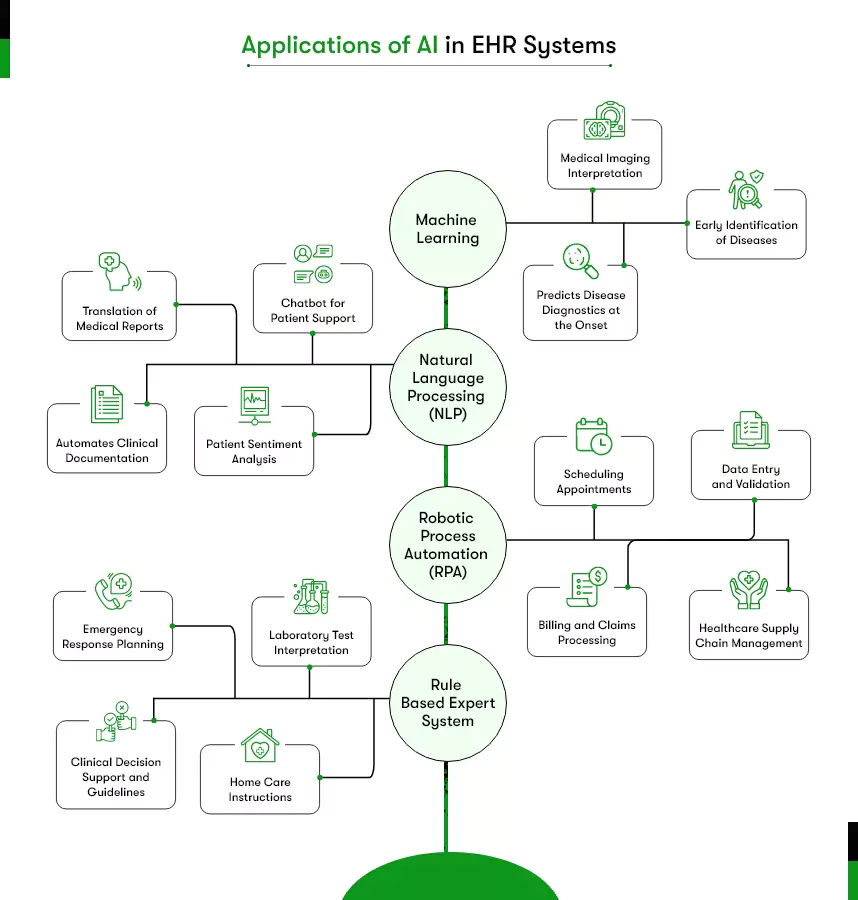
Clinical Decision Support (CDS):
AI-powered CDS provides real-time recommendations and alerts to healthcare professionals based on patient data, assisting with diagnosis and treatment decisions. That would otherwise take significant time with a traditional EHR system.
Disease Progression:
The capability of AI algorithms can help your healthcare organization save many lives just by being proactive. You can build specific AI algorithms that analyze patient data, predict disease progression, identify at-risk patients, and recommend preventive measures.
Structured Data:
As discussed in AI use cases in EHR, you can use NLP technology to convert unstructured clinical notes into structured data. Consequently, it becomes easier to extract valuable information from free-text documentation.
Automated Documentation:
By integrating Robotics Process Automation into EHR, you can automate clinical documentation, reducing the administrative burden and ensuring accurate records.
Chatbot for Patient Engagement:
You can build a personalized chatbot and offer virtual assistance, patients can engage with them and get answers to their questions.
Security and Privacy Enhancement:
AI strengthens data security by monitoring access and identifying potential security threats, ensuring compliance with healthcare regulations. Hence, you can focus on implementing robust security measures and protecting patient data, ensuring compliance with healthcare regulations like HIPAA.
Drug Recommendations:
AI can suggest the most appropriate medications and dosages by analyzing the patient’s historical data and following clinical guidelines.
Administrative Operations:
You can employ AI to automate administrative tasks, such as appointment scheduling and insurance verification, improving the overall efficiency of healthcare practices.
Patient Portal:
To elevate the patient experience with healthcare organizations, you can allow them to access their records, appointment scheduling, and secure communication with a tailored portal.
Interoperability:
An EHR needs to support data sharing and interoperability with other healthcare systems to promote seamless information exchange.
What Technology to use to build high-performing AI-powered EHR?
AI-powered EHR development requires a robust technology stack. A technology stack includes programming languages, front and back-end development frameworks, APIs, databases, etc. However, what technology to choose depends on whether you want to build an EHR mobile app and/or web app. Because mobile and web app development technology differs greatly.
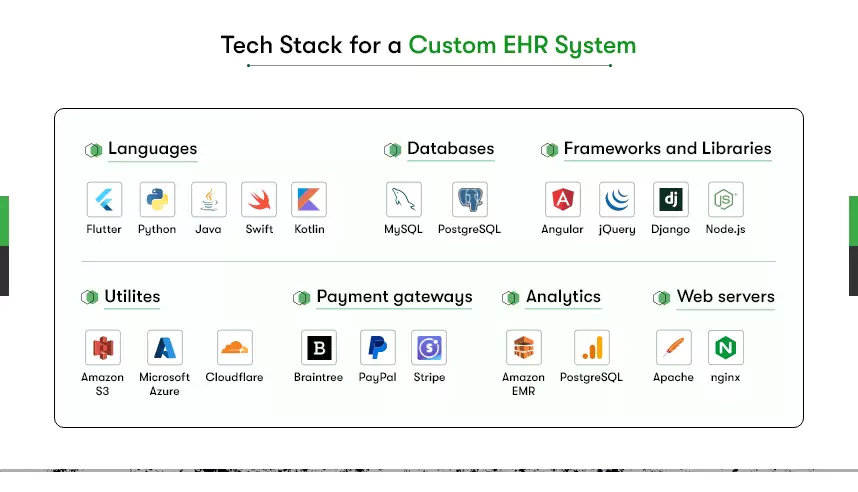
If you want to build a high-performing EHR app (currently trending) in addition to a responsive web app, Flutter is the solution. Flutter is a cross-platform app development framework by Google, enabling web, mobile, and desktop app development from a single codebase. You can learn more about the benefits of Flutter for healthcare app development here.
To leverage Google’s brainchild to the fullest, hiring skilled Flutter developers with experience in healthcare app development is crucial. So, look for developers who are proficient in Dart, have a strong understanding of HIPAA compliance, and are well-versed in integrating AI components into mobile applications.
How Does AI Enhance EMR and EHR Efficiency?
Efficiency is a critical factor in healthcare and integrating Artificial Intelligence (AI) into Electronic Medical Record (EMR) and Electronic Health Record (EHR) systems is transforming the way medical services are delivered. AI-powered EHR solutions streamline workflows, enhance accuracy, and improve patient care by automating complex processes and providing intelligent insights.
1. Real-Time Clinical Support
AI-driven EMR systems offer instant support in emergencies by analyzing patient data in real-time. Whether it’s identifying potential drug interactions, flagging critical health alerts, or assisting with medical decision-making, AI enhances the speed and accuracy of healthcare interventions.
2. Improved User Interfaces
AI enhances EHR efficiency by creating intuitive, user-friendly interfaces. Healthcare providers can access and update patient records more easily, reducing administrative burdens and allowing them to focus more on patient care.
3. Data-Driven Decision Making
By analyzing vast amounts of health data, AI helps healthcare professionals make informed, evidence-based decisions. This leads to quicker diagnoses, personalized treatment plans, and improved patient outcomes.
By incorporating AI into EHR and EMR systems, healthcare organizations can optimize efficiency, reduce errors, and provide smarter, more effective patient care, ultimately advancing the entire healthcare ecosystem.
How much does EHR Development cost?
The AI-powered EHR development cost ranges from $30000 to $70000 or more. The fluctuation in the cost is caused by a set of factors like complexity, features, and the scale of the project.
The cost breakdown for building an AI-based EHR system includes the following factors:
Scope and Complexity: Planning, defining and designing the size and intricacy of the project account for 15-20% of the budget.
Features and Functionality: Advanced AI features and extensive functionalities are necessary now but can consume 20-25% of the budget due to the development effort and research involved.
Customization: Tailoring the EHR system to meet specific organizational needs may require 10-15% of the budget.
Regulatory Compliance: Ensuring compliance with healthcare regulations, such as HIPAA, demands 10-15% of the budget for rigorous security measures and testing.
Data Integration: Complex data integration with existing healthcare systems and databases can influence costs, about 10-15% of the budget.
User Interface and Experience (UI/UX): It’s essential to make your EHR user-friendly and easy to navigate for better usability, which may require 5-10% or more of the EHR development cost.
Testing and Quality Assurance: Your Electronic Healthcare Record system contains sensitive information that is supposed to be confidential. Thus, you must conduct extensive testing before implementing EHR into your operations. And this thorough testing may take up 10-15% of the budget to create an EHR.
Deployment and Maintenance: After AI-powered EHR development, to ensure successful deployment and maintain the EHR system’s high performance through regular updates, you need to allocate 10-15% of the budget.
In addition, you should also consider the below expenses while budgeting for your AI-powered EHR.
- AI integration and data migration costs,
- Infrastructure expenses– cloud hosting, server maintenance, and data storage,
- Implementing security measures and compliance with healthcare regulations like HIPAA.
Note: While these factors affect the cost of developing or integrating AI in EHR, their cost consumption may differ based on your specific EHR requirements.

How to develop an EHR – Electronic Health Record System?
Before developing an Electronic Health Record (EHR) system, assembling the right team is vital. Consider outsourcing the project to experienced EHR software developers. Outsourcing offers several benefits, including saving time, reducing costs, and tapping into the expertise of a skilled development team.
When hiring, if relevant, prioritize developers with experience in healthcare software, HIPAA compliance, and AI integration.
Concept Validation: Choosing the Right EHR Type
First, let’s clarify the type of EHR system you need. There are various types, such as Ambulatory EHR (for clinics), Inpatient EHR (for hospitals), and Specialty EHR (for specific medical practices).
Carefully assess your healthcare organization’s requirements to select the most suitable type. Typically, EHR systems are built by custom software development teams that include engineers, healthcare professionals, and data experts.
Discovery and Prototypes: Setting the Foundation
In the discovery and prototype phase, lay the groundwork for your EHR system development. This stage involves in-depth research and planning to define project goals, user needs, and system requirements.
To visualize how the EHR will work, create prototypes and mockups. These visuals help ensure that the system aligns with the workflow of healthcare professionals, making it more efficient and user-friendly.
Design and Development: Bringing Your AI-powered EHR to Life
During the design phase, your skilled designers focus on crafting a user-friendly interface. Ensure prioritizing ease of use and accessibility of your EHR, keeping healthcare professionals in mind.
Simultaneously, software engineers work on building the EHR system itself. This also includes developing and integrating AI algorithms and features. For example, incorporate AI algorithms for tasks like predictive analytics, natural language processing (NLP), and image recognition.
It’s a crucial step to ensure your EHR functions seamlessly and complies with industry standards and regulations.
Debug and Launch: Ensuring a Smooth Takeoff
After development, rigorous testing and quality assurance take center stage. This phase is vital to ensure data accuracy, security, and system reliability. Once the EHR system is thoroughly tested and free of any issues, it’s time to launch your EHR.
After the launch, monitor the system, address emerging issues, and adapt to evolving healthcare needs.
As you develop your EHR system, remember that each stage plays a pivotal role in creating a dependable and efficient healthcare solution. Therefore, outsourcing to experienced developers can make this journey smoother, ensuring that your EHR meets the unique demands of your healthcare organization.
Why Kody Technolab for EHR development?
Selecting the right partner for your EHR software development is paramount, and Kody Technolab offers unparalleled expertise in this domain. We are well-versed in crafting EHR solutions that precisely match your healthcare organization’s needs. Our proficiency extends to leveraging Flutter, a cutting-edge cross-platform framework, ensuring seamless functionality across all platforms.
Security and compliance are at the forefront of our priorities. We meticulously adhere to HIPAA regulations, guaranteeing the utmost patient data protection. What truly distinguishes us is our commitment to customization. From initial concept to post-launch support, we provide comprehensive assistance, including the seamless integration of AI-driven features to enhance patient care.

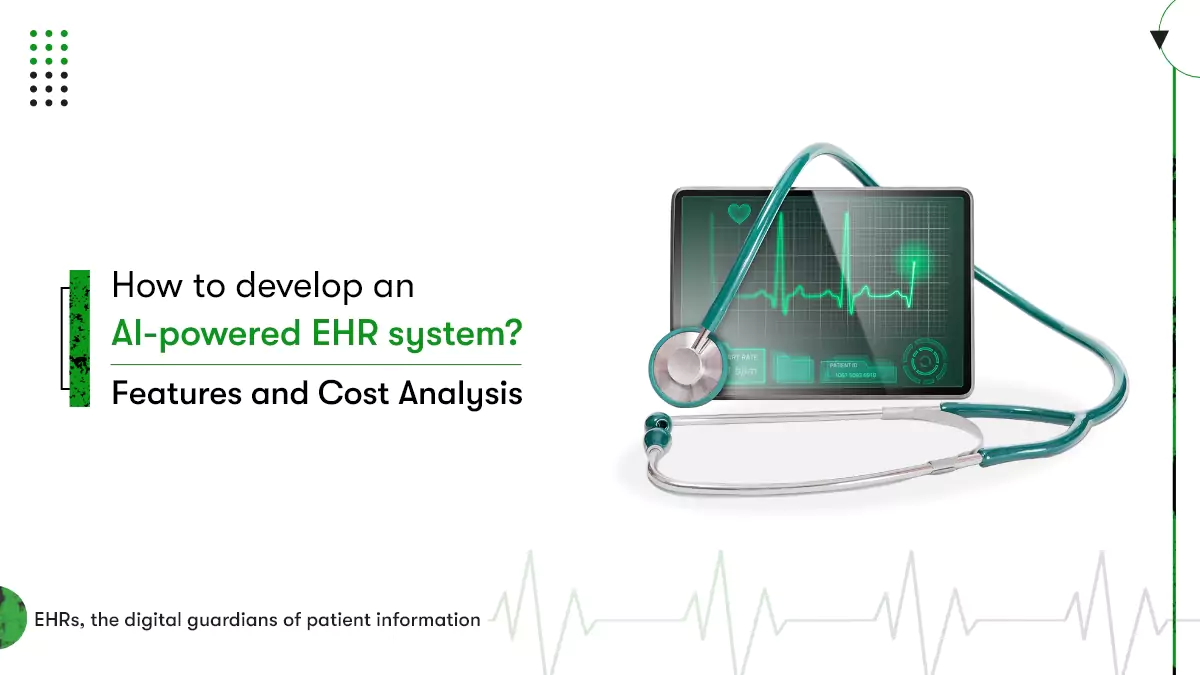
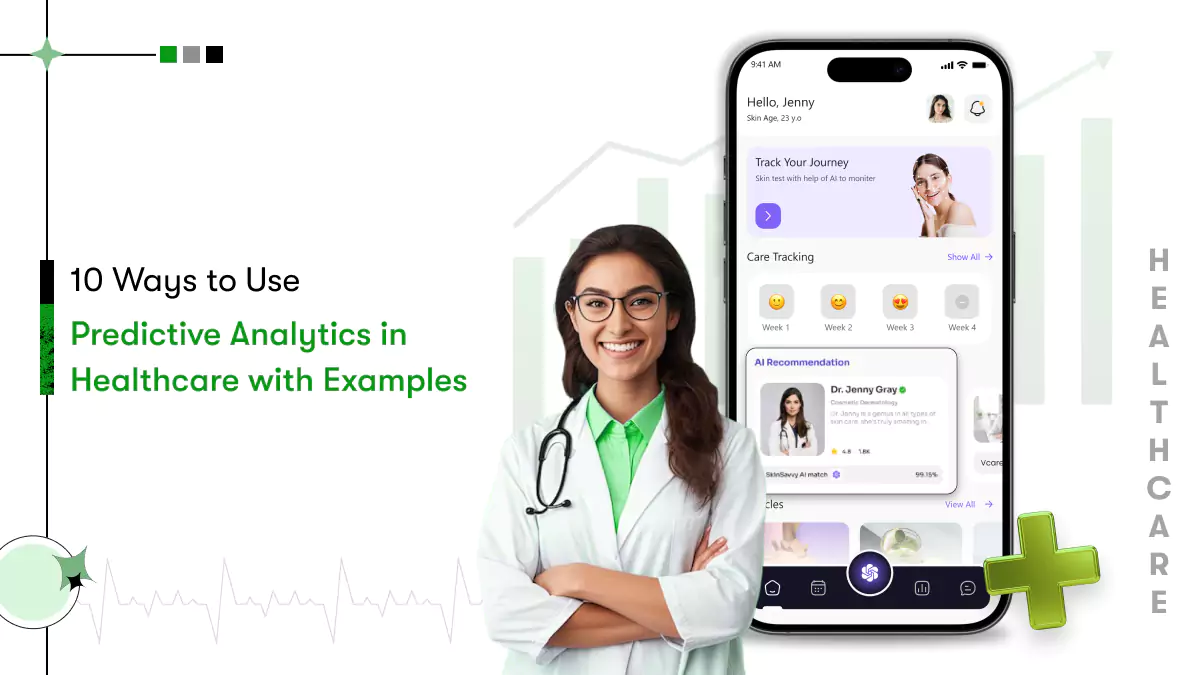
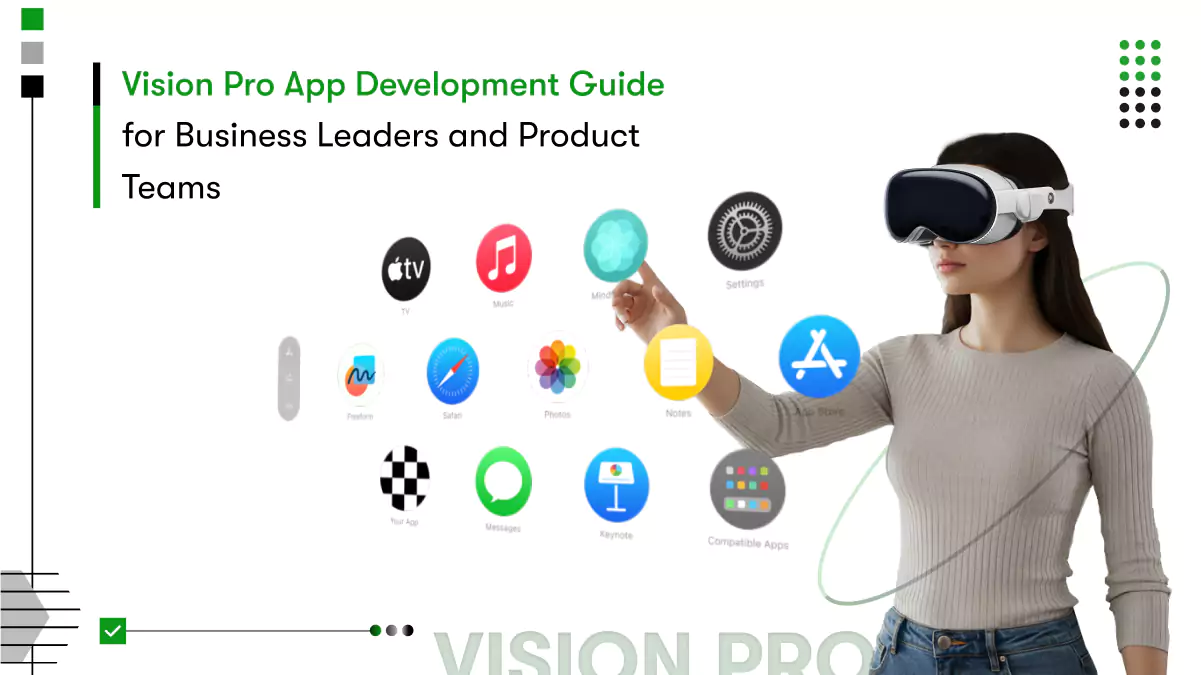

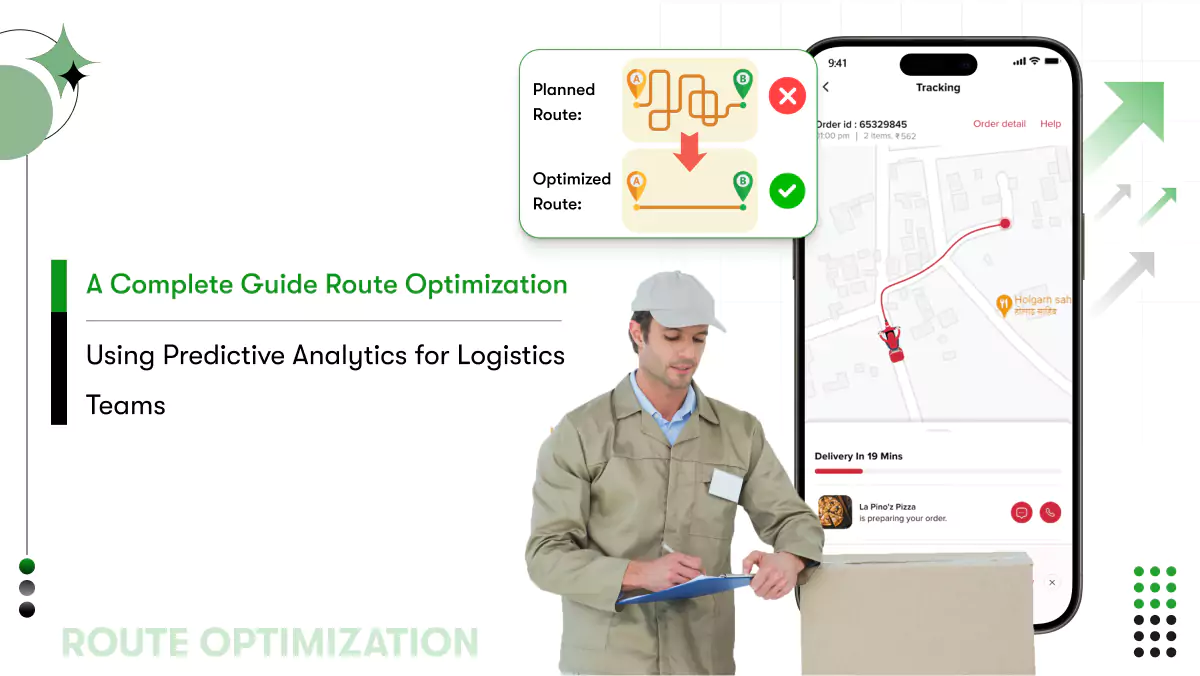






 Contact Information
Contact Information